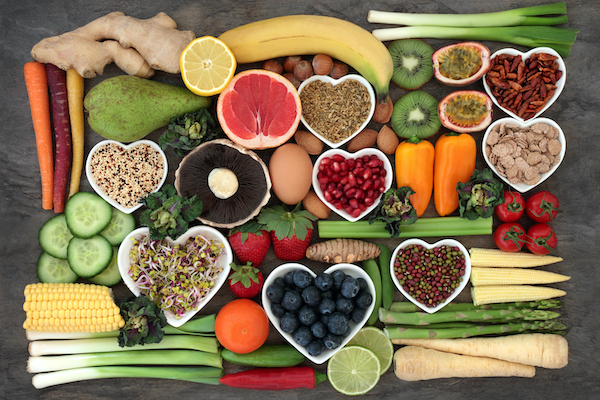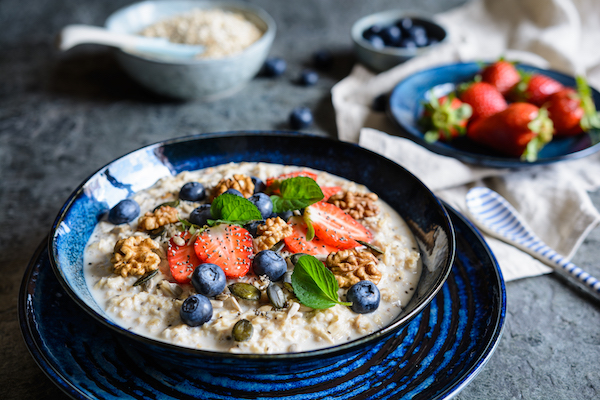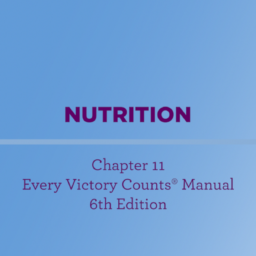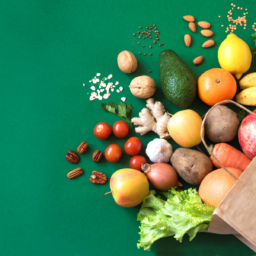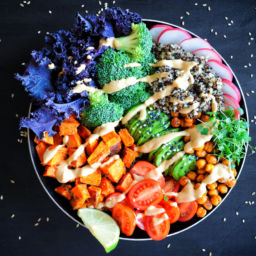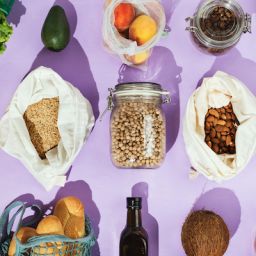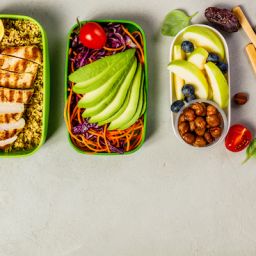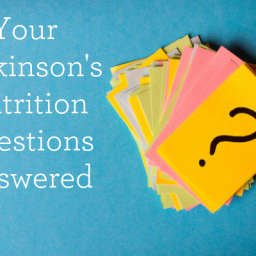Written by Martha Henze, MPH, MS, RDN (Registered Dietitian Nutritionist)
Most of you have been cooking for much of your life; however, COVID-19 may change your purchasing habits and increase your desire to strengthen your immune system. Buying and eating foods that are part of the five nutrient-rich food groups (fruits; vegetables; lean meats and poultry, fish, eggs, tofu, nuts and seeds, and legumes/beans; whole grains; and low-fat dairy) – ones that contain the maximum vitamins and minerals per bite – to help keep you healthy.
To decrease the number of times that you go to the grocery store, create a weekly meal plan with healthy ingredients using these three steps.
Step 1: Check your pantry, refrigerator, and freezer to see what you have at home first
- Plan meals for the entire week based on what you already have in your kitchen to decrease trips to the grocery store and save money
- Use MyPlate as a guideline to plan a balanced and healthy meal which consists of the following:
- Lean protein – a serving is about the size of a deck of cards
- A variety of fruits and vegetables that fill half of your plate
- Whole grains - choose whole grains with three to five grams of fiber per serving
- Low-fat dairy or your favorite source of calcium for strong bones
- Plan meals for five days a week
- Leave two days a week for leftovers or to be spontaneous
- Remember to cook once and eat twice by doubling some of your recipes
- Freeze leftovers for quick meals on days you don't feel like cooking
Step 2: Make a grocery list which includes fresh, frozen, dried, and canned goods
Organize your weekly shopping list by aisle so you can get in and out of the grocery store quickly.
Step 3: Stock your kitchen with non-perishable foods
If you're running low on staples, use the next section as a guide.
How to Stock Your Kitchen
It doesn't take much to stock your kitchen, but the payoff is great when you want to make something and realize you already have all of the ingredients you need.
Long-lasting Fresh Fruits and Veggies
- Apples
- Bananas
- Oranges/Mandarin Oranges
- Grapefruit
Nutrition tip:
Citrus fruits, such as oranges and grapefruits are great sources of vitamin C, which helps fight infections. The daily recommended intake (DRI) for vitamin C for men is 90 mg and for women is 75 mg. Eating one medium-sized orange or drinking ½ - ¾ cup of orange juice provides you with the Vitamin C you need each day.
- Carrots
- Tomatoes
- Sweet potatoes
- Broccoli
- Avocadoes
- Fresh Spinach
Canned Goods & Soups
- Tomatoes, diced or fire-roasted
- Spaghetti sauce – garden variety for more vegetables
- Chicken, vegetable, and beef broths
- Canned tuna, salmon, chicken
- Bean soups – lentil, split pea – for added protein
- Black, kidney, white, garbanzo beans
- Canned fruits: Choose those packed in their own juice, rather than syrup
- Peanut/almond/cashew/sun butter
- Old-fashioned oatmeal/steel-cut oatmeal
Nutrition tip:
Canned tomatoes are a rich source of the antioxidant lycopene which is important for heart health and cancer prevention. Because lycopene is held tightly in the skin of the tomato, the high heat of canning releases more lycopene from the tomato tissue which means more can be absorbed by your body. Therefore, canned tomatoes contain more lycopene than fresh ones.
Snacks
- Dried fruit: apricots, figs, prunes, raisins (choose ones that aren't coated in sugar)
- Nuts: almonds, cashews, walnuts, pecans, pistachios
- Popcorn (plain)
Refrigerator Section: Dairy, Cheese, and Eggs
- Milk – low-fat or a dairy-alternative (of the dairy alternatives, soymilk has the highest protein per cup)
- Eggs
- Cheese
- Block
- Shredded cheese (store in the freezer and take out the amount you need)
- Cottage cheese – low-fat
- Margarine – For heart health, choose spreads that are low in saturated fats
- Low-fat yogurt/Greek yogurt
Nutrition tip:
Greek yogurt has twice the amount of protein than regular yogurt. Protein keeps you fuller longer and is especially important for seniors to prevent the natural loss of muscle mass due to aging. Choose low-fat plain Greek yogurt rather than flavored which can be high in sugar. Add your own flavor with fresh fruit.
Frozen Foods
Meats & Seafood
- Chicken breast
- Frozen salmon
- Veggie burgers
- Hamburgers
- Frozen shrimp
Grains
- A loaf of whole-grain or sprouted grain bread such as Ezekiel 4:9
- Dry pasta: Try pasta made from protein alternatives, such as chickpeas and lentils. This type of pasta packs more fiber and protein than traditional pasta. Look for brands that have just one ingredient.
- Couscous: It takes less than seven minutes to cook
Others
- Frozen vegetables (with no added sauces) like broccoli, spinach, and carrots are great as a side dish or to throw into soups, casseroles, or stews
- Frozen fruit (with no added sugar) like strawberries, raspberries, blueberries, and mangos are great to add to smoothies or warm oatmeal.
- Whole grain waffles
- Whole-grain vegetable pizza
Once you're home, eat the foods that will perish first. For example, eat your fresh spinach and broccoli before your canned or frozen vegetables. Stocking healthy staples and making weekly menus will decrease your trips to the grocery store and strengthen your immune system.
Also, whenever you return from the store, remember to wash your hands thoroughly for at least 20 seconds and to avoid touching your face.
Looking for a healthy way to start your day using staples?
Try this simple recipe for nutritious and delicious overnight oats. This recipe was developed over 100 years ago by Swiss physician Maximilian Bircher-Brenner to improve the health of his patients.
Swiss Overnight Oats (Bircher Muesli)
Ingredients
- 2 cups low fat yogurt or Greek yogurt
- 2 cups raw (not cooked) old-fashioned oats
- 2 cups low fat milk
- 1 mashed banana
- 1 finely cut or grated apple with peel
- 1/4 cup of nuts
- 1/4 cup dried fruit with no added sugar such as raisins
- Optional:
- 1/4 teaspoon of salt
- 1 teaspoon chia seeds
- 1 teaspoon cinnamon
Directions
- In a large bowl, stir together the first three ingredients.
- Add the rest of the ingredients and stir well.
- Place in the refrigerator overnight. You can add fresh or frozen berries in the morning and a splash of milk if you want a thinner consistency or just eat it the way it is. Delicious, filling and healthy!
If you have some, please share your meal planning tips for decreasing your trips to the grocery store in the comment section.
Want More Practical Articles Like This?
Much more can be found in our Every Victory Counts® manual. It’s packed with up-to-date information about everything Parkinson’s, plus an expanded worksheets and resources section to help you put what you’ve learned into action. Request your copy of the Every Victory Counts manual by clicking the button below.


